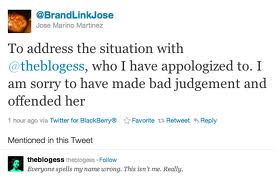
Last month, a top-ten firm cooked up a PR mess when it tried to surprise bloggers by serving frozen entrees from a client brand instead of the freshly cooked meals the guests were led to expect. The duped bloggers started an epic food fight, dishing on the agency and their client online for weeks after the event.
More recently, a boutique firm ran afoul of Jenny Lawson, a/k/a The Bloggess, by pitching her a news item that wasn’t germane to her brand of personal and highly irreverent humor. The situation would likely not have risen to the level that it did, except that an unfortunate PR exec hit “Reply All” when complaining about Lawson to a colleague, calling her a “f–king bitch.” Of course, Lawson instantly posted the note, and a subsequent (badly crafted) apology, and her legions of loyal readers leaped to her defense. Over a thousand comments were posted in a couple of days.
So, what is it with these bloggers? Are they just overly sensitive, or are PR people inept at engaging with them?
Of course, many of the principles of good media relations apply to bloggers, but it’s a mistake to equate the two as audiences. Bloggers aren’t just like everyday journalists; in most cases, they don’t answer to an editor or publisher, and many have a highly individualistic voice and following that is unique to their blog. It often makes more sense to look at them as influencers than media.
Here, then, are some blogger relations basics that may bear repeating.
Be personal. Unlike traditional journalists, most bloggers cover topics of intense personal interest. It’s their job to be biased, subjective, or even provocative. So, approach them the same way. Know the blog and its subject matter, and whatever you do, show some personality and awareness of their voice and following. Anyone who’s read The Bloggess, for example, will know that it’s not suited for a commercial pitch.
Be relevant. Ditto. Of course, any pitch should be preceded by research, but just know that, while a typical reporter may ignore an ill-advised approach, a blogger just might make you the poster child for PR spam. Many bloggers just don’t need or accept mainstream pitches, so know that before you go there.
Know the community. Better yet, be a part of it. Start by commenting on a recent post. If you like it, RT it on your own feed.
Be collaborative. If appropriate, think in terms of traffic-building ideas like reader promotions and giveaways; exclusive content angles; or sweepstakes that build readership.
Be respectful. Don’t be dismissive of smaller or niche blogs, as sometimes narrow outlets have deeply passionate followings. My team arranged a modest reader giveaway for an e-commerce client on a home design blog I’d frankly never heard of; the result was 8000 new newsletter sign-ups in a single day.
The Bloggess says it best. “Treat every blogger as if they have a dark army at their disposal.” Because, often, they do.

